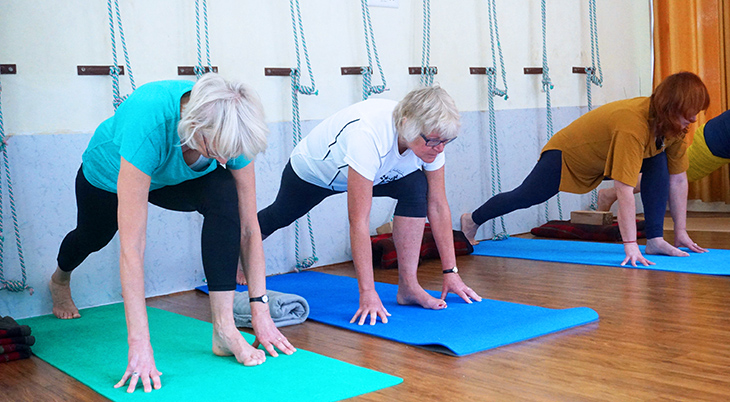5 Tips For Boosting Your Energy Levels
Living in today’s hectic world can take a toll on your well-being and leave you feeling drained and depleted of energy. Reasons behind fatigue can be diverse, and with a global health crisis in progress, taking proper care of your physical and mental health is crucial to feeling revitalized, motivated, and eager to take advantage of life’s opportunities and better deal with hardships.
Not being able to achieve everything you want in a day can be frustrating. However, there are things you can do to boost your productivity.
Let’s take a closer look at 5 tips for boosting your energy levels.
1. Reduce Your Stress Levels
 (Meditation Photo: Ksenia Makagonova)
(Meditation Photo: Ksenia Makagonova)
When you often stress about things, or when you are anxious and worried, especially if it lasts for a while, it will leave you feeling worn out and lacking the energy to get you through the day.
Practicing relaxation techniques like yoga, meditation, or autogenic training can improve your energy levels. Mindful breathing that supports a state of relaxation and balance is at the foundation of all these techniques. If you have never practiced any relaxation technique, start with a simple act of slow, deep breathing. Breathing exercises have a surprisingly calming and energizing effect.
According to a study, practicing yoga for meditation for just 25 minutes can significantly improve brain function, energy levels, and mood.
2. Focus on Improving Your Nutrition
 (Healthy Food – Fruit and Granola Photo: Ksenia Makagonova)
(Healthy Food – Fruit and Granola Photo: Ksenia Makagonova)
Eating a well-balanced, healthy diet is a great way to keep your energy levels stable throughout the day. Another important thing to bear in mind is to consume your meals at the same time, since irregular mealtimes can harm your circadian rhythm and affect your energy levels negatively.
You may have already heard this too many times, but it’s as simple as that – breakfast is an important meal, setting your energy levels for the rest of the day. In times of crisis, it is more important than ever to be mindful of your food choices. Make sure to consume fresh, nutrient-dense foods that will boost your energy and keep your health in check.
Stick to produce high in vitamins, minerals, and antioxidants, and fiber to keep you healthy and energized. Foods rich in nutrients can also help you enhance your immune system, besides keeping your energy levels at their optimum.
3. Include Exercise into Your Daily Routine
 (Yoga Fitness / Exercise Class Photo: Ekta Agarwal)
(Yoga Fitness / Exercise Class Photo: Ekta Agarwal)
Incorporating physical activity into your daily schedule will help you stay energized and in a good mood. Exercise is known to enhance both mood and productivity.
Feeling sluggish in the middle of the day is common, especially as the years go by. Stretching exercises are great for energizing when you need that little push to get you throughout the day.
Regular exercise will keep your body in excellent shape. Cardiovascular exercises are vital for heart and lung efficiency, and strength training will help you turn back the years on your body and keep it healthy, strong and functional. Combining walking, jogging, and cycling with strength workouts is the go-to recipe for staying strong and vital.
While recommended social distancing / isolation measures are in place, you can walk around inside your home, use your stairs as a “stepper”, jog on the spot, use a home treadmill, or cycle on a stationary bike. Listening to upbeat music or watching a nature channel on TV while you workout, can boost your energy level further.
4. Make Sure to Get a Good Night’s Rest
The power of good quality sleep at night is often underestimated. A good night’s rest helps us prevent fatigue and recover when we had a particularly challenging or stressful day. A shortened sleeping time or disrupted sleep can greatly affect our health and energy levels, especially when they happen frequently. Adults usually need between 7 and 9 hours of sleep at night to feel rested and revitalized. Disrupted sleep has been linked with mental health issues and even neurodegeneration.
Prioritizing sleeping hygiene can help you improve your sleeping patterns. A nighttime routine like going to bed and getting up at about the same time every night/each morning, supports proper sleeping habits.
Practicing calming activities like reading or journaling before heading to bed can promote restorative sleep. Also, make sure to avoid exposure to screens like those of a smartphone or laptop before going to bed, since the blue light stimulates you to stay awake even when you are tired.
5. Delegate Tasks
Most of us are trying to juggle many responsibilities, from simple house chores to our important work projects. When we try to be everything to everybody and take care of the household, the kids, and everything else on our own, it can lead to major burnout. When we get to that state, we tend to feel tired constantly; our sleep quality deteriorates, as well as our productivity and happiness.
Luckily, delegating tasks is a skill that can be learned. Redistributing some of your responsibilities can reduce the amount of mental and physical load you are dealing with, and lead to a greater sense of well-being.
To avoid energy depletion and stay focused all day long, establish proper lifestyle habits. Practicing self-care and taking good care of yourself can help you maximize your energy levels and lead the life you want.
*Images are via Unsplash. This article is for informational purposes only and is not intended as medical or mental health advice, nor is it a substitute for professional medical or mental health advice, diagnosis, or treatment. Always seek the advice of a qualified physician or mental health provider with any questions you may have regarding a medical or mental health condition. This website does not recommend or endorse any specific products, services, opinions, or other information that may be mentioned on the Site or on other websites it links to. Reliance on any information provided by this website or other websites it links to, is solely at your own risk.*




